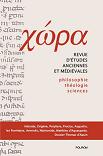Plaisir et acte selon Alexandre d’Aphrodise
Plaisir et acte selon Alexandre d’Aphrodise
Author(s): Gweltaz Guyomarc’hSubject(s): History of Philosophy, Ancient Philosphy
Published by: EDITURA POLIROM S.A.
Keywords: Aristotelian ethics; pleasure;
Summary/Abstract: According to some testimonies, the Aristotelian ethics have been torn between a hedonist reading, as much as an anti‑hedonist one, throughout Antiquity. From Critolaos to Verginius Rufus and Sosicrates, pleasure is considered both as “an evil [that] gives birth to many other evils” and as the first appropriate thing and the supreme good. This noteworthy disagreement stems from a famous difficulty within the Aristotelian corpus, raised by Aspasius, i.e. the alleged coexistence of two ‘definitions’ of pleasure in Aristotle’s Nicomachean Ethics VII and X. In this paper, I offer a reconstruction of Alexander’s treatment of this difficulty, based on some passages from Alexander’s Ethical Problems and the Mantissa. I try to show that Alexander does not dismiss the so‑called “definition A” of pleasure (the unimpeded activity of one’s natural state) as being spurious, although he obviously values more the definition B (according to which pleasure perfects the activity as a kind of supervenient end). Even if he never openly brands the definition A as “dialectic” (like Aspasius), Alexander takes it as a reputable endoxon, which however needs to be emended in that it blurs the distinction between pleasure and activity. Pleasure only supervenes on the activity to which it is appropriate, and this supervenience is precisely what accounts for the inaccuracy of the definition A. As much as the child conflates the apparent good and the good, so the hedonist takes pleasure to be identical with the activity and the telos of human life. On the contrary, for Alexander, pleasure is actually only a sign of happiness and the shadow of the activity
Journal: Chôra. Revue d'études anciennes et médiévales
- Issue Year: 2019
- Issue No: 17
- Page Range: 181-209
- Page Count: 29
- Language: French
- Content File-PDF

